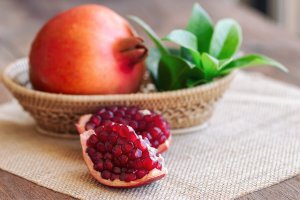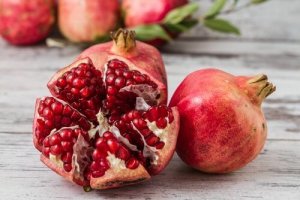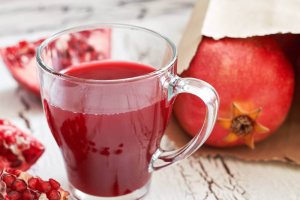The Power of Pomegranate for our Athletic Performance

Pomegranate is a fruit that isn’t typically consumed, even though it has a large number of nutritional properties. However, this fruit should interest you, especially if you do some kind of sport since it can significantly and positively affect your athletic performance.
In addition, it can be eaten in different ways, and it’s also possible to include it in many typical dishes. In this article, we’ll tell you about the most delicious ways you can eat a pomegranate.
If you still don’t know about all of its properties and benefits, you still have a chance to get on board. Next, we’ll analyze the nutritional value of this fruit and how it affects athletic performance.
Pomegranate’s nutritional value
Pomegranate is a fruit with an extremely high nutritional value. Every 100 grams of this product, contains only 83 calories, which makes it a light fruit.
In addition, it’s made up of 1.67 percent proteins and 1.17 percent lipids. The most abundant nutrients are carbohydrates, which are present in 18.7 percent.
This fruit also contains 4 percent fiber and 12.6 percent sugar. Although to a lesser extent, it also contains nutrients such as calcium, phosphorus, and magnesium as well as vitamins C and B.
As you can see already, it’s a very healthy food, and it can be eaten regularly. Now that we know its nutritional value, we should start eating it to improve our athletic performance.
Pomegranate and athletic performance
As we’ve mentioned, we all should eat it because of the large number of benefits it can give us. In fact, despite containing sugar, diabetics can also eat it in moderate amounts, since it has a low glycemic index.

As for the benefits that are of interest to athletes, there’s also much to talk about. After reading about all of its virtues, you’re sure to run to the supermarket to buy this superfood and include it in your day-to-day diet.
Thanks to its quercetin content, pomegranate is perfect for facilitating muscle recovery. It’s best to eat it after training since it’s a very complete food.
On the one hand, it helps us recover from an intense workout; and, on the other, it helps nourish fluids the body, which is currently dehydrated.
Another benefit is that it helps us improve our performance while doing sports. Given all of its properties, pomegranate will help you achieve the goals you’ve set for yourself.
Besides, because it contains a high number of antioxidants, pomegranate contributes to the elimination of toxins and decreases cell damage. These are two of the most important aspects to consider because they’re essential for any athlete.
It’s also important to note that pomegranate is rich in nitrates. People don’t usually talk about these elements, but they’re crucial for athletes.
To keep things simple, we can say that nitrates, once inside our body, become nitric oxide. This allows our blood vessels to dilate, thus allowing for the passage of a more considerable amount of air. As a consequence, athletic performance is noticeably increased.
Pomegranate juice, a healthy and quickly prepared option
Now that you know all the benefits of eating pomegranates, it’s time to think about how to include them in your typical diet. In fact, you can do it very easily since you can add them to any salad or toast, both sweet or salty. In addition to being very healthy, the mixture of flavors is exquisite, and it won’t cost you any effort to take it.

Another recommendation is that you ingest it in the form of juice. It’s a simple, fast, and very effective way to recover from an extreme workout session.
Pomegranate juice is an excellent alternative to commercial drinks. And, as with many other occasions, it’s not necessary to complicate our lives with specialized drinks, since simple foods such as pomegranate contain many properties.
To conclude, pomegranate juice is perfect for nourishing the body and comes with all of the benefits that we’ve mentioned above. Know that you know all about the beneficial qualities of pomegranate, drink or eat some to hydrate yourself and recover the liquids that you’ve lost.
Pomegranate is a fruit that isn’t typically consumed, even though it has a large number of nutritional properties. However, this fruit should interest you, especially if you do some kind of sport since it can significantly and positively affect your athletic performance.
In addition, it can be eaten in different ways, and it’s also possible to include it in many typical dishes. In this article, we’ll tell you about the most delicious ways you can eat a pomegranate.
If you still don’t know about all of its properties and benefits, you still have a chance to get on board. Next, we’ll analyze the nutritional value of this fruit and how it affects athletic performance.
Pomegranate’s nutritional value
Pomegranate is a fruit with an extremely high nutritional value. Every 100 grams of this product, contains only 83 calories, which makes it a light fruit.
In addition, it’s made up of 1.67 percent proteins and 1.17 percent lipids. The most abundant nutrients are carbohydrates, which are present in 18.7 percent.
This fruit also contains 4 percent fiber and 12.6 percent sugar. Although to a lesser extent, it also contains nutrients such as calcium, phosphorus, and magnesium as well as vitamins C and B.
As you can see already, it’s a very healthy food, and it can be eaten regularly. Now that we know its nutritional value, we should start eating it to improve our athletic performance.
Pomegranate and athletic performance
As we’ve mentioned, we all should eat it because of the large number of benefits it can give us. In fact, despite containing sugar, diabetics can also eat it in moderate amounts, since it has a low glycemic index.

As for the benefits that are of interest to athletes, there’s also much to talk about. After reading about all of its virtues, you’re sure to run to the supermarket to buy this superfood and include it in your day-to-day diet.
Thanks to its quercetin content, pomegranate is perfect for facilitating muscle recovery. It’s best to eat it after training since it’s a very complete food.
On the one hand, it helps us recover from an intense workout; and, on the other, it helps nourish fluids the body, which is currently dehydrated.
Another benefit is that it helps us improve our performance while doing sports. Given all of its properties, pomegranate will help you achieve the goals you’ve set for yourself.
Besides, because it contains a high number of antioxidants, pomegranate contributes to the elimination of toxins and decreases cell damage. These are two of the most important aspects to consider because they’re essential for any athlete.
It’s also important to note that pomegranate is rich in nitrates. People don’t usually talk about these elements, but they’re crucial for athletes.
To keep things simple, we can say that nitrates, once inside our body, become nitric oxide. This allows our blood vessels to dilate, thus allowing for the passage of a more considerable amount of air. As a consequence, athletic performance is noticeably increased.
Pomegranate juice, a healthy and quickly prepared option
Now that you know all the benefits of eating pomegranates, it’s time to think about how to include them in your typical diet. In fact, you can do it very easily since you can add them to any salad or toast, both sweet or salty. In addition to being very healthy, the mixture of flavors is exquisite, and it won’t cost you any effort to take it.

Another recommendation is that you ingest it in the form of juice. It’s a simple, fast, and very effective way to recover from an extreme workout session.
Pomegranate juice is an excellent alternative to commercial drinks. And, as with many other occasions, it’s not necessary to complicate our lives with specialized drinks, since simple foods such as pomegranate contain many properties.
To conclude, pomegranate juice is perfect for nourishing the body and comes with all of the benefits that we’ve mentioned above. Know that you know all about the beneficial qualities of pomegranate, drink or eat some to hydrate yourself and recover the liquids that you’ve lost.
All cited sources were thoroughly reviewed by our team to ensure their quality, reliability, currency, and validity. The bibliography of this article was considered reliable and of academic or scientific accuracy.
- Viru, A., & Viru, M. (2001). Análisis y control del rendimiento deportivo. Human Kinestics.
- Granada. Federación Española de Nutrición. Recuperado de: http://www.fen.org.es/mercadoFen/pdfs/granada.pdf
This text is provided for informational purposes only and does not replace consultation with a professional. If in doubt, consult your specialist.








